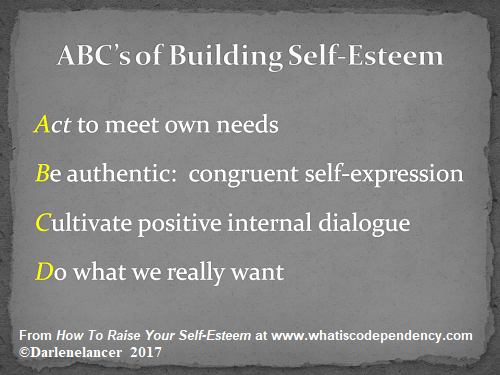 Why does self-esteem matter? People with low self-esteem suffer from a lack of self-confidence, even despite greater professional and educational opportunities than ever before. Self-confidence is a manifestation of self-esteem and self-worth.
Why does self-esteem matter? People with low self-esteem suffer from a lack of self-confidence, even despite greater professional and educational opportunities than ever before. Self-confidence is a manifestation of self-esteem and self-worth.
It all begins with a sense of “Self.” Without this, it is difficult to be alone, to make decisions, to set boundaries, to identify and accomplish goals, to succeed professionally, and to enjoy healthy, intimate relationships.
Self-esteem varies on a continuum. Fortunately, you can grow your self-esteem and increase your capacity for self-fulfillment. It will enhance your creativity, ambition, physical and emotional health, loving relationships, and resilience in the face of adversity. It is the key to success. On the other hand, poor self-esteem underlies anxiety, depression, addiction, and sexual dysfunction.
Women and Self-Esteem
Women generally have lower self-esteem than men. Lack of self-esteem for girls starts as early as nine years old and steadily worsens in adolescence, even if they excel in school. They learn to dress and behave in ways to be accepted by their peers and attract boys’ attention. These are normal developmental challenges, but when the opinions of others dominate, girls learn to adapt to “other” esteem, and lose a connection to their own identity. If this pattern takes root, it’s a prescription for unhappiness and problems in work and relationships. It’s also one of the reasons women are less happy than men, particularly in recent years as traditional roles that once provided an identity for women have eroded.
What do I actually mean by self-esteem and self-worth? It is a realistic, positive self-concept, humbly accepting your attributes and shortcomings. It is a feeling of worth, determined neither by comparison to nor approval from others. It is a feeling of appreciation and satisfaction with yourself, not based on beauty, talent, achievement, intelligence, status, or popularity. It is inner contentment – a feeling of “I have value, worth, and am lovable.” Just as a toddler and each breed of dog, cat, and horse are unique and lovable, so are you. I use them as examples, because worth is intrinsic and not based on accomplishments or beauty, and need not be earned.
Healthy parenting helps to establish self-esteem, but it is not a substitute. You can be loved and admired, even have prestige and material success, and still lack core self-esteem. Some leading actors and CEO’s can only temporarily bask in the reflection of their success, ever compelled to exceed their last performance. Without self-esteem, as soon as a lover leaves, self-worth plummets. Chasing after others’ approval, material possessions, physical perfection, or worldly success, even if achieved, is ephemeral and won’t result in self-esteem, because it is an inner state of consciousness, independent of external events – a peaceful state of mind – not striving, judging, competing, or in conflict with itself. This doesn’t mean you don’t have goals. On the contrary, more creativity, courage, and energy are freed to accomplish them, and more satisfaction is attained.
Self-Responsibility
Developing a “Self,” requires time, attention, and responsibility, which is often so terrifying that people turn to others to determine what to think and how to feel and act. They hide, even from themselves, their inner emptiness. Only you can determine your values and what gives your life meaning, and only if you have the courage to be completely honest with yourself, will you begin to discover your real self. It means getting to know and love yourself – building a relationship, as you would with a friend – and becoming your own best friend. This takes attentive listening, quiet time, and commitment. But the alternative is to be lost at sea, continually trying to prove or improve yourself or win someone’s love, while never feeling truly lovable or enough – like something is missing.
Self-responsibility is dependent on your ability to live consciously, to grow in self-awareness, the willingness to be honest with yourself and to take responsibility for your thoughts, actions, and life. No matter what others think, self-esteem is based on what you think of yourself – your integrity with yourself.
Steps to Take
Low self-esteem is learned, and so is healthy self-esteem. There are concrete steps you can take to raise your self-esteem. They are simple, but not easy, and usually, people need outside support. this is because left to ourselves, we default to our old patterns of thinking and behavior.
- Take action to meet your needs. This is difficult for codependents who are generally in denial of their needs or don’t value them enough to meet them.
- Express yourself. This requires self-knowledge and self-esteem. Then it takes courage. You can learn to be authentic and How to Be Assertive. The act of setting boundaries both signals and boosts your self-worth.
- Pay attention to your negative self-talk and instead affirm yourself.
- Take action to meet your goals.
Building self-esteem is an exciting path of self-exploration on the road to self-love. In other posts, I provide tips and tools to grow self-responsibility and self-esteem. Learn to identify the signs of healthy and low self-esteem and how it impacts your relationships.
You can begin today to build self-esteem by overcoming self-criticism. Get 10 Steps to Self-Esteem: The Ultimate Guide to Stop Self-Criticism and my webinar, How to Raise Your Self-Esteem.
Copyright, Darlene Lancer, JD, MFT 2010
